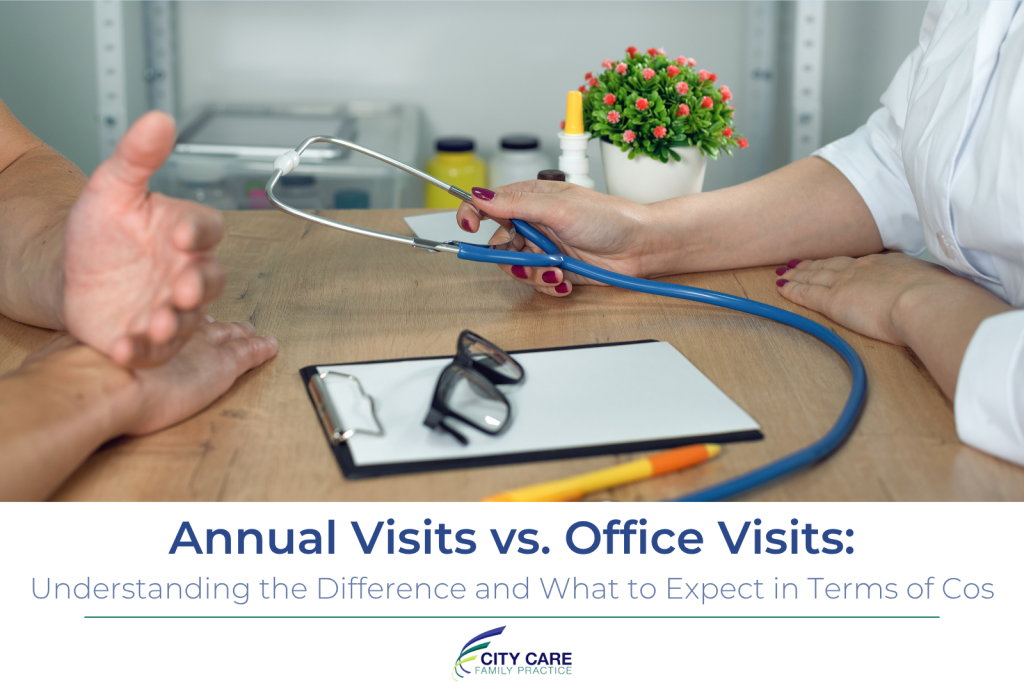
When it comes to managing your health, regular check-ups with your primary care physician are essential. However, not all doctor visits are created equal. One of the most common sources of confusion for patients is the difference between an annual wellness visit and a regular office visit. Understanding this distinction can help you better prepare for your appointments, avoid unexpected charges, and make the most of your healthcare benefits.
What Is an Annual Visit?
An annual visit, also known as a preventive care visit or annual physical, is a comprehensive check-up designed to assess your overall health, identify potential risks, and provide guidance on maintaining your well-being. These visits are typically covered by insurance without a copay or deductible, thanks to the Affordable Care Act (ACA), which mandates that many preventive services be provided at no additional cost to the patient.
During an annual visit, your healthcare provider will typically:
- Review your medical history and family health history
- Perform a physical exam
- Check vital signs, including blood pressure, heart rate, and respiratory rate
- Assess your overall physical and mental health
- Order routine screenings and lab tests (e.g., cholesterol, blood sugar, cancer screenings)
- Discuss lifestyle choices, such as diet, exercise, and tobacco use
- Provide age-appropriate vaccinations
- Offer personalized advice for maintaining long-term health
What Is an Office Visit?
An office visit is more focused on addressing specific health concerns, symptoms, or ongoing medical issues. Unlike annual visits, office visits are generally not covered as part of preventive care and often require a copay, deductible, or coinsurance payment, depending on your insurance plan.
Office visits are appropriate for:
- Managing chronic conditions (e.g., diabetes, hypertension)
- Addressing new or worsening symptoms
- Reviewing test results that indicate a need for further evaluation
- Receiving treatment for acute illnesses, such as the flu or a persistent cough
- Discussing medication side effects or adjustments
- Getting referrals to specialists
Why Patients Sometimes Receive Unexpected Bills
It’s not uncommon for patients to receive unexpected bills after an annual visit. This often happens when a preventive visit turns into a diagnostic visit. For example, if you mention a new symptom or ongoing concern during your annual physical, your provider may need to address it as a separate medical issue. This can lead to additional charges, as it shifts part of the visit from preventive care to diagnostic care, which is billed differently by insurance companies.
How to Avoid Unexpected Charges
- Be Clear About Your Visit Type: When scheduling your appointment, clearly state whether you are coming in for a routine annual physical or to discuss a specific health concern.
- Prepare for Your Visit: If you have health concerns that you want to discuss, consider scheduling a separate office visit to avoid unexpected charges.
- Understand Your Insurance Coverage: Review your insurance policy to know what is covered under preventive care versus diagnostic care.
- Communicate with Your Provider: If you have questions about billing, don’t hesitate to ask your provider or the front desk staff before your appointment.
Q&A Section
Q: Why did I receive a bill after my annual visit? A: If your provider addresses a specific health concern, orders additional tests, or prescribes medication during your annual visit, your insurance may classify part of the visit as diagnostic care, which is not fully covered under preventive care benefits.
Q: Can I discuss my ongoing health issues during my annual visit? A: It’s generally best to keep annual visits focused on preventive care. If you have ongoing health concerns, it’s a good idea to schedule a separate office visit to ensure all your needs are properly addressed.
Q: How can I avoid unexpected medical bills? A: Be clear about the purpose of your visit when scheduling and review your insurance benefits to understand what is covered as preventive care versus diagnostic care.
Contact Information City Care Family Practice
461 Park Ave South, Fl 9
New York, NY 10016 (at 31st Street)
Phone: (212) 545-1888
If you have questions about your upcoming visit or need to schedule an appointment, please call us today.
